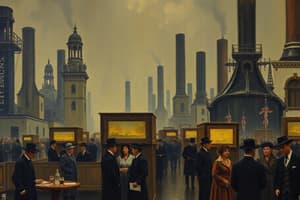Podcast
Questions and Answers
What was the significance of the Bessemer Process introduced in 1856?
What was the significance of the Bessemer Process introduced in 1856?
- It provided a cure for tuberculosis.
- It was the first method to generate electricity.
- It allowed for faster production of naval vessels.
- It revolutionized the separation of metals quickly. (correct)
Which invention is attributed to Benz in 1886?
Which invention is attributed to Benz in 1886?
- First proper car (correct)
- First armored naval ship
- First electrical generator
- First gasoline engine
How did the introduction of electricity impact labor according to the content?
How did the introduction of electricity impact labor according to the content?
- It eliminated the need for skilled labor.
- It allowed workers to produce more efficiently. (correct)
- It increased reliance on natural light for work.
- It reduced the hours workers could operate machinery.
What was the outcome of the naval battle between the USS Monitor and the CSS Virginia?
What was the outcome of the naval battle between the USS Monitor and the CSS Virginia?
What was the impact of steel production on naval warfare as mentioned in the content?
What was the impact of steel production on naval warfare as mentioned in the content?
Who invented the telephone in 1876?
Who invented the telephone in 1876?
What was a significant advantage of the Transcontinental Railroad when completed in 1869?
What was a significant advantage of the Transcontinental Railroad when completed in 1869?
What concept did Taylorism introduce to manufacturing processes?
What concept did Taylorism introduce to manufacturing processes?
Which law established a 10-year ban on Chinese immigration in 1882?
Which law established a 10-year ban on Chinese immigration in 1882?
What is a monopoly in the context of corporations?
What is a monopoly in the context of corporations?
Which skyscraper is recognized as the first built in Chicago?
Which skyscraper is recognized as the first built in Chicago?
Which of the following individuals is known as the father of modern economics?
Which of the following individuals is known as the father of modern economics?
What was a common characteristic of the laborers who built the Transcontinental Railroad?
What was a common characteristic of the laborers who built the Transcontinental Railroad?
Flashcards are hidden until you start studying
Study Notes
Industrialization in Europe
- Coincided with Reconstruction and western wars; marked by the Second Industrial Revolution.
- Bessemer Process (1856): revolutionized steel production by separating metals quickly, impacting Europe and the US.
- Louis Pasteur's research (1879): developed vaccines for rabies and tuberculosis, which historically killed about 25% of the world’s population; identified the dangers of mold in food.
- Werner von Siemens (1867): invented the first electrical generator, revolutionizing power production and extending work hours beyond daylight.
- Karl Benz introduced the Benz Patent-Motorwagen (1886), regarded as the first proper car, reaching speeds of 10 mph.
- Rudolf Diesel invented diesel fuel, enhancing transportation efficiency.
- Michelin promoted travel with tires, highlighting the connection between mobility and leisure.
Naval Warfare Changes Forever
- Civil War naval battles highlighted advancements in naval technology.
- CSS Virginia defeated wooden Union ships on March 8, 1862; the March 9 encounter with USS Monitor resulted in a stalemate, marking a turning point in naval warfare.
- An arms race ensued as nations developed ironclad vessels to avoid being outclassed.
- Introduction of Dreadnoughts by the British Royal Navy in 1892 emphasized the shift to steel battleships objectified in terms of fear and power projection.
Inventions Galore
- Thomas Edison: inventor of the lightbulb, developed the American version of the generator, first motion picture camera, self-copying pen, and held 1,093 patents.
- The first skyscraper, the Home Insurance Building, was constructed in Chicago in 1885, symbolizing urban growth.
- Alexander Graham Bell invented the telephone in 1876, leading to the formation of AT&T; later pioneered wireless radio technology in 1899, using elevated towers to enhance broadcast range.
- Guglielmo Marconi contributed to radio technology and the use of it in hobbies, photography, and music.
Railroads
- Railroads essential for transporting western resources to the east.
- The Transcontinental Railroad was constructed between 1863 and 1869, featuring Union Pacific (red line) and Central Pacific (blue line) sections.
- Approximately 20,000 laborers, including German, Irish, Italian, Chinese, African American, and Native Americans, built the railroad; Chinese workers faced the most perilous labor conditions and received low pay.
- The Chinese Exclusion Act of 1882 imposed a 10-year immigration ban on Chinese laborers, reflecting societal fears about ethnic competition.
- Completion date: May 10, 1869; enabled coast-to-coast travel in five days, effectively closing the frontier.
The Rise of Corporations
- Taylorism emerged as a scientific approach to manufacturing, streamlining production by dividing tasks, making the US the leading manufacturer by 1900.
- Corporations thrived in an unregulated environment, influenced by John Locke’s and Adam Smith’s economic theories advocating minimal government intervention.
- Corporations monopolized industries by acquiring smaller businesses, reducing competition; resulting in the concentration of wealth among a few, known as the Captains of Industry.
Studying That Suits You
Use AI to generate personalized quizzes and flashcards to suit your learning preferences.




